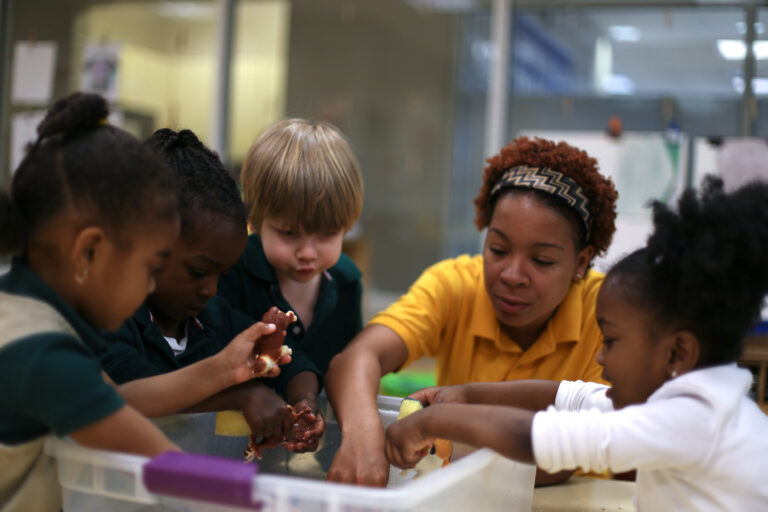Just before the start of this school year, I had the privilege of serving as the closing speaker at the Alabama Early Childhood Education Conference, the theme of which was the “Measure of Tomorrow.”
The new school year was on the immediate horizon, and the teachers had already been through three intense days of preparation. Conscious of the time they had already spent, they did not need to hear from me. I needed to hear from them – educators who had remained steadfast to their children against all odds during COVID and in a country that refuses to honor its covenant of equal opportunity to all its children.
Digging post-it notes out of my bag, I distributed them, along with pens, and asked, “What are your hopes and dreams for each child and for your work this year?” I also asked if they would place their notes on the wall. They did, without hesitation.
When I collected the notes, their answers hit me with their profound consistency.
“To give them the absolute best of me.”
“I want my children to fall in love with learning.”
“I hope for me to be the teacher my children always need.”
“I want to help make them better people for a better world.”
“I dream that my children know they are loved, are safe and are important.”
“My hope is for them to be better than I was.”
“To just keep going – if I fall, get back up and keep going.”
“That I’ll be better than I was yesterday.”
“To succeed and to be more educated.”
The hopes and dreams they laid out for their children read like sacred promises. Love. A better world. And time and again, the desire to provide safety – not just physical safety, but the security and power of knowing that they were with someone who believed in them. As a result, there was an unwavering intensity in what the teachers expected of themselves: an unrelenting desire for their own improvement and greater impact.
And, at the end of our time together, I asked if the teachers would share what they needed from all of us.
“More training. More support. More pay. More understanding.”
“We need to feel appreciation.”
“Support, because it shows you are behind us. Money, because it shows you know we work hard. Resources, because it allows us to give more to our children. Appreciation. Let us know we are appreciated.”
“Educate our educators. Financial support for meals, books, crafts, room décor – and more pay. Emotional support through encouragement; physical support through more teachers.”
“Let us teach. We must change with the times. Pay more and stop blaming teachers for social problems.”
Honest answers, from real preschool teachers – each an echo of the one before.
The headlines about a “teacher shortage” hide a brutal truth. As those post-it notes drove home, the truth is that we have shorted our country’s teachers and have robbed far too many children of their futures in the process. We have denied teachers the training, the agency, the resources, the respect, and the compensation that allow them to do their jobs effectively, to see the impact of their efforts in child outcomes, and to know that their work really matters.
Training. Compensation. Agency. Expertise. And to know they matter. That is what we have failed to provide. The answer summarized by one teacher, simply, “To be the best teacher I can be,” is what every one of them wants. They do not need any more empty promises or platitudes.
I had a slide in my presentation of a teacher, shown as a superhero. I brought it up. “What do you think of this?” One teacher bravely raised her hand and said, “I don’t like it. It’s an unfair expectation that we are supposed to be more, and act alone. We can’t. The truth is, we are tired – and we are human. We need support.”
Coming off this Thanksgiving weekend, now months into the school year, we are thankful to be part of the commitment that Alabama has been making over the past several years to its early childhood educators. By example, through the Alabama Partnership for Children, 2,500 teachers – in home-based centers and preschools – have been awarded more than $320,000 in stipends for completing coursework on children’s early brain development, trauma-informed practices, language acquisition, and pre-literacy skills through the Atlanta Speech School’s Rollins Center for Language & Literacy’s free online Cox Campus. In addition, 4,300 early education stakeholders are enrolled in further statewide training, and many receive weekly support through their state’s outstanding cohort of highly trained coaches.
How do we extend the results they see in Alabama’s homes, centers, and classrooms to every teacher? What promise are we ready to make to them? It begins with the moral imperative that we keep our committed early childhood teachers in their classrooms and provide them with the resources required to ensure that all their children are on the path to decide their own futures.
We are seeing this in Alabama. And in Ohio, the DOE is providing an early care credential, the first of its kind, also through hours completed on Cox Campus. In Georgia, the birthplace of the solution making this possible elsewhere, we are laying the groundwork for the same – as part of Mayor Andre Dickens’ commitment to make Atlanta the best place to raise a family.
Let’s admit how much we need our teachers and support them in the ways they need us. There is no more important profession to the future of our children. It is time to act.
ABOUT THE ATLANTA SPEECH SCHOOL AND ITS ROLLINS CENTER & COX CAMPUS
The Rollins Center for Language & Literacy (Est. 2004) is a professional development team that partners with public and private organizations to bring the Atlanta Speech School’s expertise in language and literacy to teachers, healthcare professionals and other adults locally, regionally, and globally. Its Cox Campus (Est. 2014) is the only resource of its kind – providing free courses and resources to adults in all 50 states and 80 countries who work with children across the entire continuum of deep reading brain construction from the last trimester of pregnancy through third grade and beyond.



